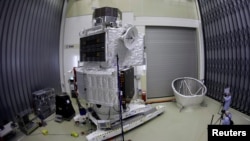A joint mission of the European and Japanese space agencies, the spacecraft BepiColombo is set to make a close, initial flyby of Mercury on Friday as part of a seven-year mission to put two probes in orbit around the solar system's closest planet to the sun.
In a statement on its website, the European Space Agency explains the spacecraft, launched in 2018, will swoop by Mercury on Friday at an altitude of about 200 kilometers (124.3 miles), capturing imagery and data that will give scientists preliminary information on the planet they hope to explore in depth when the mission puts two probes into orbit there in 2025.
The ESA says the British-built spacecraft will make use of the gravitational swing of nine planetary flybys — one at Earth, two at Venus, and six at Mercury — together with the spacecraft's solar electric propulsion system, to help steer into Mercury's orbit.
The craft made a second flyby of Venus and collected pictures of the planet as it passed within 570 kilometers (354 miles) of its surface.
The spacecraft's main mission — in collaboration with the Japan Aerospace Exploration Agency (JAXA) — is to study the structure of Mercury and its magnetic field. When BepiColombo finally arrives, it will release two probes that will independently investigate the surface and magnetic field of Mercury.
The ESA-developed probes will operate in Mercury's inner orbit, while the JAXA probe will be in the outer orbit to gather data that would reveal the internal structure of the planet, its surface and geological evolution.
Scientists hope to build on the insights gained by NASA's Messenger probe, which ended its mission in 2015 after a four-year orbit of Mercury. The only other spacecraft to visit Mercury was NASA's Mariner 10 that flew past the planet in the mid-1970s.
Some information for this report came from the Associated Press and Agence France-Presse.





